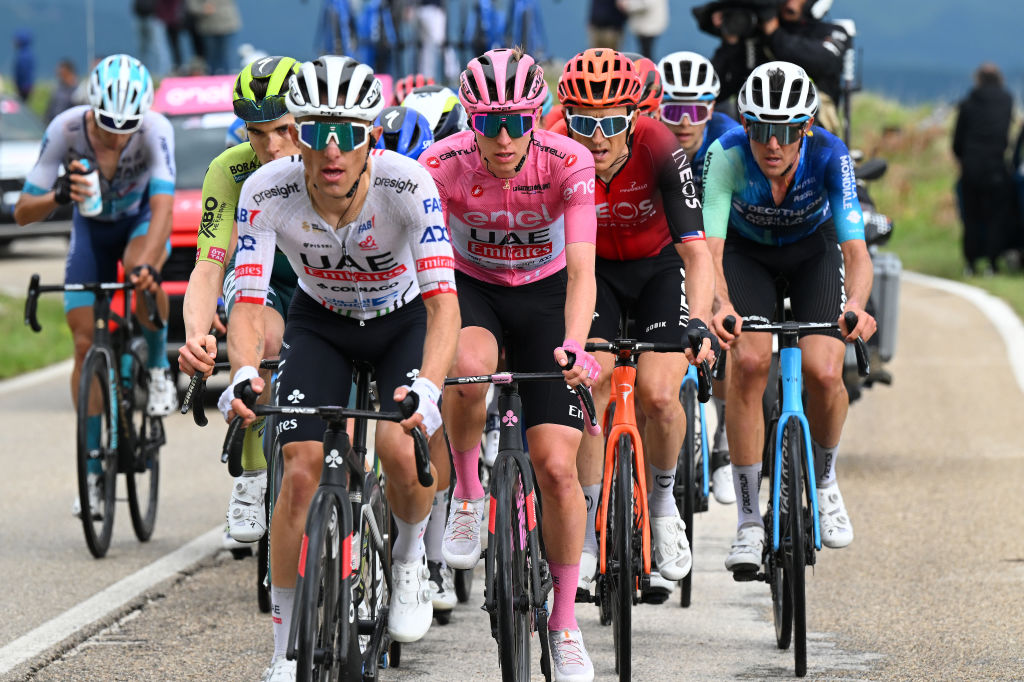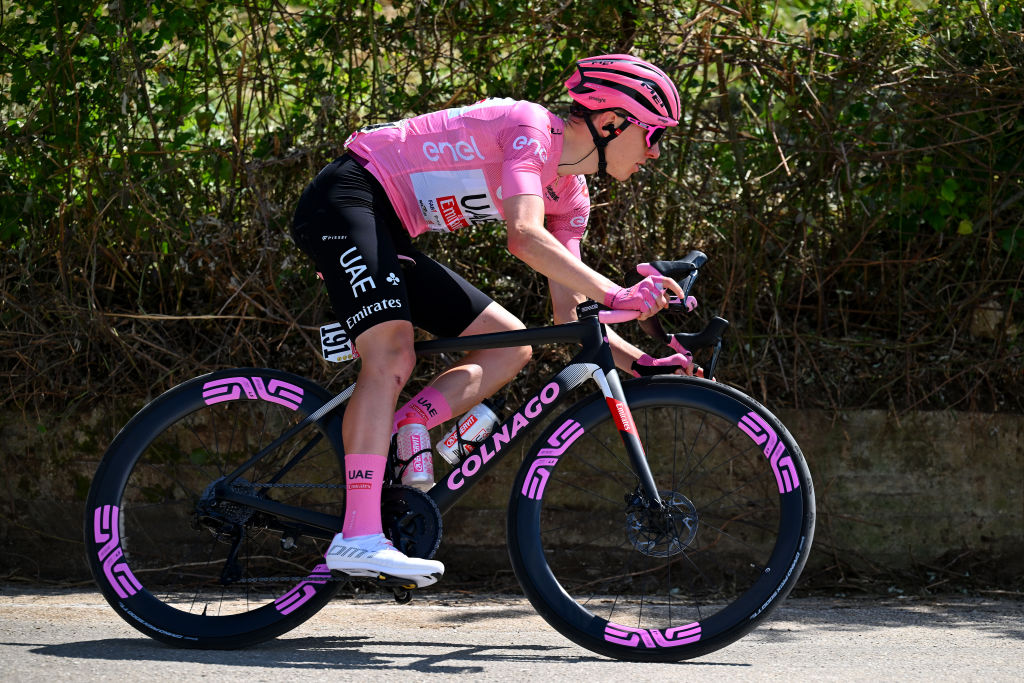
Three miles or so from the summit of Bocca della Selva, a pair of merry tifosi stood at the roadside brandishing a banner outlining their admiration for Tadej Pogačar’s ongoing dominance of this Giro d’Italia. “Pogačar: No attack, no party,” it read.
The sentiment appears to have been rather different within the peloton on stage 10. After Pogačar’s extravagant dominance of the opening week, many were braced for the onslaught to resume when the race set out from Pompei on Tuesday after its first rest day.
Instead, Pogačar and his UAE Team Emirates guard opted for clemency, allowing a sizeable early break to go the distance and then yielding control of the pink jersey group to Bahrain Victorious on the final haul to the finish above Cusano Mutri.
On a similar stage to Prati di Tivo at the weekend, UAE had been remorseless in shutting down the break of the day, with Pogačar equally ruthless in unfurling a crisp sprint to claim the summit. This time out, the Slovenian settled for rolling quietly home in the company of the podium contenders, 3:14 behind stage winner Valentin Paret-Peintre (Decathlon-AG2R).
“If I’m honest, I would say in a nice way that everybody is happy,” Pogačar said gnomically when asked about his tactics on the day.
He must have known, of course, that he was immediately going to be asked to expand on that answer. With respect, why would Pogačar particularly care whether everybody else in the race is happy?
“Actually, it’s not about if I can win or not. In the end, we rode easier and then Bahrain pulled, they set a harder pace on the climb. We were not in control of the climb anymore,” Pogačar said. “In my opinion, it would have been better just to go how we wanted to the finish, but sometimes there’s too many people in the peloton saying that we need to share a piece of pie.”
To this point in his career, Pogačar has rarely, if ever, cared all that much about making friends and influencing people in the peloton. While many Grand Tour leaders over the years have treated stages as chips to be bargained, Pogačar has generally held a Merckxian view of the world, seeing them simply as more races to be won.
Approaching the midpoint of a Giro where he seems to be utterly without rival, Pogačar appears to have made modifications to that default approach, even if he added that his team’s tactics on Tuesday had also been informed by the need to keep something in reserve for the tests coming at the end of this week.
“It’s just that sometimes you can grab the option, and sometimes you cannot,” Pogačar said. “Today was a 50-50. I would say at Prati di Tivo it was easier to take it. Sometimes, you don’t need to force your team and yourself for the stage win – because we need to think about the next days, not just about the others being happy, to be clear. We need to think about the next three days, the time trial and then the queen stage at the end of the week.”
Attacks

In the overall standings, Pogačar retains a lead of 2:40 over Daniel Martínez (Bora-Hansgrohe) and Geraint Thomas (Ineos), who were again content simply to come home in the same postcode as the maglia rosa. As at Prati di Tivo, the only attacks from the pink jersey group here came from Antonio Tiberi (Bahrain Victorious), currently 6th overall and enjoying a fine debut Giro.
“Tiberi is the only rider that so far showed some balls,” Pogačar said admiringly in the mixed zone. “He’s the only one that’s been on the attack on the last two mountain stages, and today Bahrain did most of the work on the final climb. I must say he is really good. I admire him that he showed courage, and I wish him good legs.”
In truth, Tiberi’s attacks have stemmed from his desire to divest Cian Uijtdebroeks (Visma-Lease a Bike) of the white jersey rather than from any notion that he could remotely threaten Pogačar’s overall lead. The riders closer to Pogačar on the standings, on the other hand, have been understandably cautious.
“Maybe they’re not strong enough like Antonio,” Pogačar said. “But today was also not the climb to attack. Still, he’s trying, and for this, I respect him a lot.”
The Giro has rarely been kind to first-time participants, but ten stages in, Pogačar looks to have adapted smoothly to its rigours. All three-week races, he suggested, ultimately boil down to a question of managing fatigue. So far, he looks fresher than allcomers here.
“In a Grand Tour, you’re fatigued from day three or four already because it’s not what the body is used to. Then you just accumulate this fatigue, you accept it,” Pogačar said. “I think you come with chronic fatigue at the end, and that’s why we always say you need a big rest at the end of a Grand Tour. You are in fatigue for maybe more than two weeks.”
Pogačar’s Grand Tour exertions won’t end in Rome, of course. It’s striking that the Tour de France, officially banished from his thoughts when this race set out from Turin, is now beginning to trip off his tongue more freely as the days roll by. Ultimately, his munificence to the breakaway on Tuesday was a pragmatic decision as well as a diplomatic one.
“You need to be relaxed,” Pogačar said. “I need to be calm and relaxed because I still have one big race in July to do.”
Get unlimited access to all of our coverage of the Giro d'Italia - including breaking news and analysis reported by our journalists on the ground from every stage of the race as it happens and more. Find out more.







